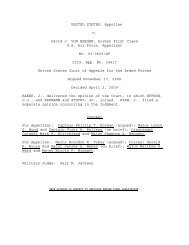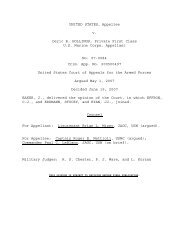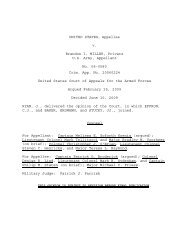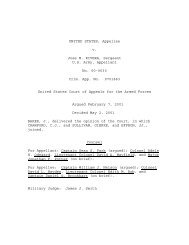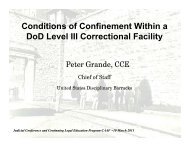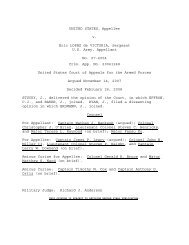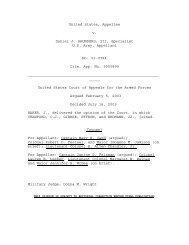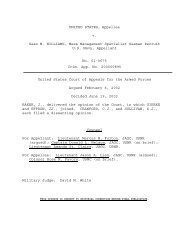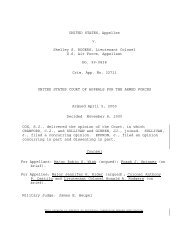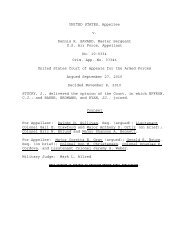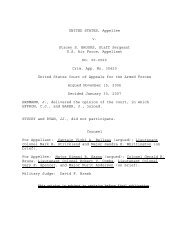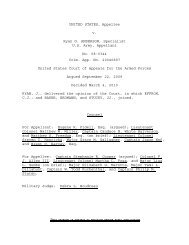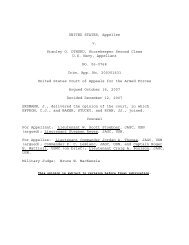Annual Report of the Code Committee on Military Justice for FY 2005
Annual Report of the Code Committee on Military Justice for FY 2005
Annual Report of the Code Committee on Military Justice for FY 2005
- No tags were found...
Create successful ePaper yourself
Turn your PDF publications into a flip-book with our unique Google optimized e-Paper software.
The Army is currently defending <str<strong>on</strong>g>the</str<strong>on</strong>g> historical practice <str<strong>on</strong>g>of</str<strong>on</strong>g> allowingline <str<strong>on</strong>g>of</str<strong>on</strong>g>ficers to defend Soldiers at special courts-martial. In Payne v.Secretary <str<strong>on</strong>g>of</str<strong>on</strong>g> <str<strong>on</strong>g>the</str<strong>on</strong>g> Army, <str<strong>on</strong>g>the</str<strong>on</strong>g> plaintiff filed suit in <str<strong>on</strong>g>the</str<strong>on</strong>g> United StatesDistrict Court <strong>for</strong> <str<strong>on</strong>g>the</str<strong>on</strong>g> District <str<strong>on</strong>g>of</str<strong>on</strong>g> Columbia challenging <str<strong>on</strong>g>the</str<strong>on</strong>g> qualificati<strong>on</strong>s<str<strong>on</strong>g>of</str<strong>on</strong>g> his n<strong>on</strong>-attorney defense counsel. Mr. Payne, a <strong>for</strong>mer Army enlistedSoldier, was c<strong>on</strong>victed <str<strong>on</strong>g>of</str<strong>on</strong>g> negligent homicide at a special court-martial inNovember 1960. He was represented by a military defense counsel who wasnot an attorney. This practice is c<strong>on</strong>sistent with Article 19, UCMJ, whichprovides that military defense counsel at a special court-martial need notbe attorneys as l<strong>on</strong>g as <str<strong>on</strong>g>the</str<strong>on</strong>g> sentence does not exceed six m<strong>on</strong>ths c<strong>on</strong>finementor <strong>for</strong>feiture <str<strong>on</strong>g>of</str<strong>on</strong>g> more than two-thirds pay per m<strong>on</strong>th <strong>for</strong> six m<strong>on</strong>ths.Plaintiff petiti<strong>on</strong>ed <str<strong>on</strong>g>the</str<strong>on</strong>g> ABCMR in 1992, and again in 2004, challenging <str<strong>on</strong>g>the</str<strong>on</strong>g>qualificati<strong>on</strong>s <str<strong>on</strong>g>of</str<strong>on</strong>g> his defense counsel, but he was denied relief. He hasfiled suit claiming that he was denied his Sixth Amendment right to counseland challenging <str<strong>on</strong>g>the</str<strong>on</strong>g> ABCMR’s denial <str<strong>on</strong>g>of</str<strong>on</strong>g> relief. The government has filed amoti<strong>on</strong> to dismiss, arguing that: (1) plaintiff’s claim is barred by <str<strong>on</strong>g>the</str<strong>on</strong>g>statute <str<strong>on</strong>g>of</str<strong>on</strong>g> limitati<strong>on</strong>; (2) his military defense counsel satisfiedc<strong>on</strong>stituti<strong>on</strong>al requirements; and, (3) <str<strong>on</strong>g>the</str<strong>on</strong>g> ABCMR lacked <str<strong>on</strong>g>the</str<strong>on</strong>g> authority tooverturn plaintiff’s court-martial c<strong>on</strong>victi<strong>on</strong>. A decisi<strong>on</strong> <strong>on</strong> <str<strong>on</strong>g>the</str<strong>on</strong>g>government’s moti<strong>on</strong> is pending.In a highly-publicized case that has lingered <strong>for</strong> many years, MichaelNew c<strong>on</strong>tinues to challenge his court-martial c<strong>on</strong>victi<strong>on</strong>. In December 2004,in New v. Secretary <str<strong>on</strong>g>of</str<strong>on</strong>g> Defense, <str<strong>on</strong>g>the</str<strong>on</strong>g> United States District Court <strong>for</strong> <str<strong>on</strong>g>the</str<strong>on</strong>g>District <str<strong>on</strong>g>of</str<strong>on</strong>g> Columbia dismissed New’s challenge to his court-martialc<strong>on</strong>victi<strong>on</strong> <strong>for</strong> refusing to wear <str<strong>on</strong>g>the</str<strong>on</strong>g> proper uni<strong>for</strong>m. SPC New was tried bycourt-martial in 1996 <strong>for</strong> refusing to wear <str<strong>on</strong>g>the</str<strong>on</strong>g> United Nati<strong>on</strong>s insignia <strong>on</strong>his uni<strong>for</strong>m during preparati<strong>on</strong> <strong>for</strong> deployment to Maced<strong>on</strong>ia. He wasc<strong>on</strong>victed <str<strong>on</strong>g>of</str<strong>on</strong>g> disobeying a lawful order and sentenced to a bad-c<strong>on</strong>ductdischarge. <strong>Military</strong> appellate courts affirmed <str<strong>on</strong>g>the</str<strong>on</strong>g> c<strong>on</strong>victi<strong>on</strong>. Mr. New<str<strong>on</strong>g>the</str<strong>on</strong>g>n sued in district court, challenging his court-martial c<strong>on</strong>victi<strong>on</strong> <strong>on</strong><str<strong>on</strong>g>the</str<strong>on</strong>g> basis that <str<strong>on</strong>g>the</str<strong>on</strong>g> order to wear <str<strong>on</strong>g>the</str<strong>on</strong>g> UN insignia was unlawful. The courtagreed with <str<strong>on</strong>g>the</str<strong>on</strong>g> Army that <str<strong>on</strong>g>the</str<strong>on</strong>g> important issues raised by New had been fullylitigated in <str<strong>on</strong>g>the</str<strong>on</strong>g> military proceedings and were thus n<strong>on</strong>-reviewable. Thedistrict court also found his o<str<strong>on</strong>g>the</str<strong>on</strong>g>r challenges were ei<str<strong>on</strong>g>the</str<strong>on</strong>g>r barred by <str<strong>on</strong>g>the</str<strong>on</strong>g>political questi<strong>on</strong> doctrine or were meritless. New appealed <str<strong>on</strong>g>the</str<strong>on</strong>g> districtcourt’s dismissal <str<strong>on</strong>g>of</str<strong>on</strong>g> his complaint to <str<strong>on</strong>g>the</str<strong>on</strong>g> Court <str<strong>on</strong>g>of</str<strong>on</strong>g> Appeals <strong>for</strong> <str<strong>on</strong>g>the</str<strong>on</strong>g> District<str<strong>on</strong>g>of</str<strong>on</strong>g> Columbia Circuit. Appellate briefs have been filed and <str<strong>on</strong>g>the</str<strong>on</strong>g> case ispending.The Army successfully defended against a double-jeopardy claim by anArmy physician who was court-martialed after entering into a pretrialdiversi<strong>on</strong> program with <str<strong>on</strong>g>the</str<strong>on</strong>g> D.C. Corporati<strong>on</strong> Counsel <strong>for</strong> <str<strong>on</strong>g>the</str<strong>on</strong>g> samemisc<strong>on</strong>duct. On 31 March <strong>2005</strong>, <str<strong>on</strong>g>the</str<strong>on</strong>g> United States Court <str<strong>on</strong>g>of</str<strong>on</strong>g> Federal Claimsgranted summary judgment to <str<strong>on</strong>g>the</str<strong>on</strong>g> Army in Ragard v. Army after c<strong>on</strong>cludingthat plaintiff’s c<strong>on</strong>stituti<strong>on</strong>al rights were not abridged by his courtmartialc<strong>on</strong>victi<strong>on</strong>. On 14 October 1997, CPT Ragard was arrested by anati<strong>on</strong>al park police <str<strong>on</strong>g>of</str<strong>on</strong>g>ficer in Washingt<strong>on</strong>, D.C., <strong>for</strong> engaging in oral sexin a public place. After plaintiff’s arrest, <str<strong>on</strong>g>the</str<strong>on</strong>g> Office <str<strong>on</strong>g>of</str<strong>on</strong>g> <str<strong>on</strong>g>the</str<strong>on</strong>g> D.C.12



